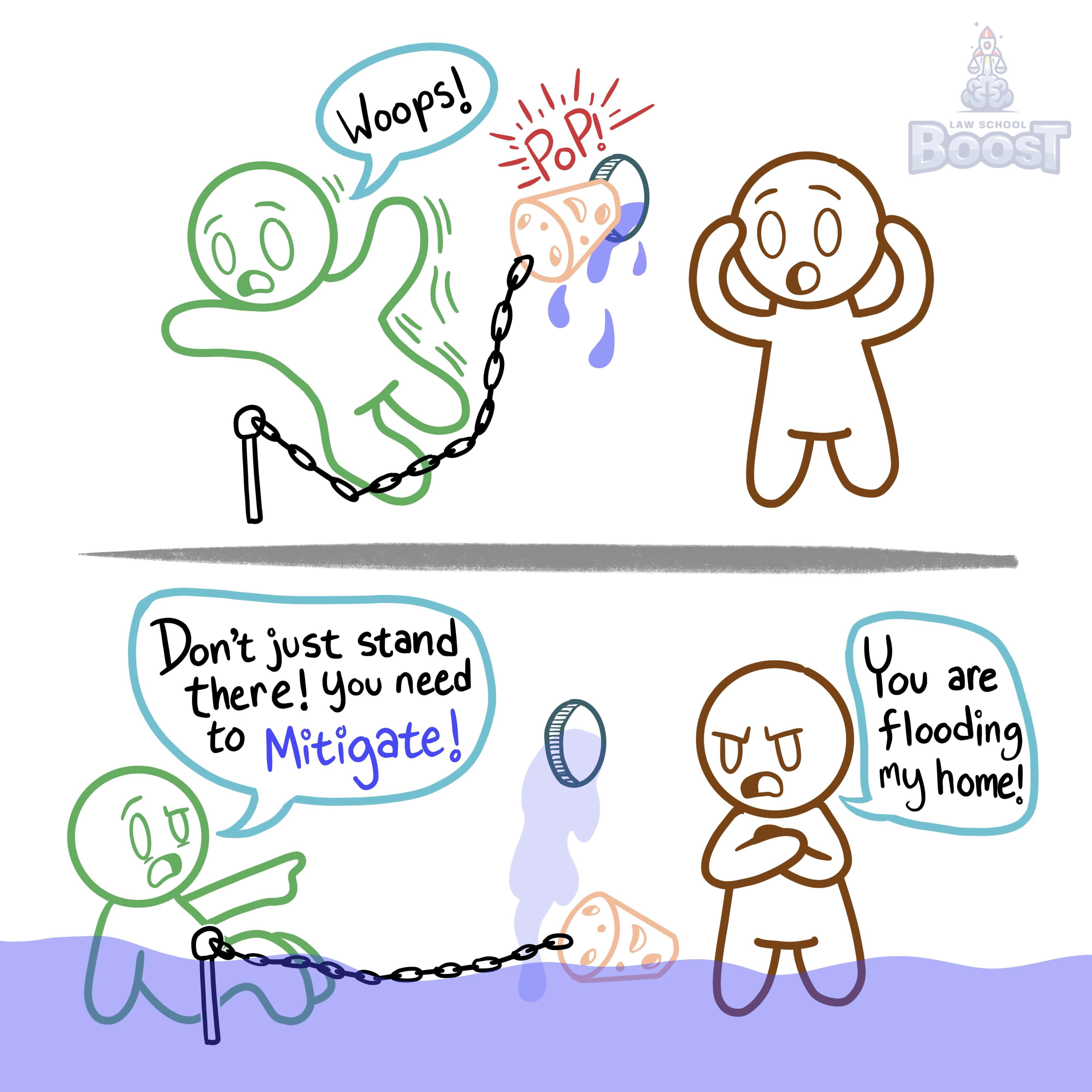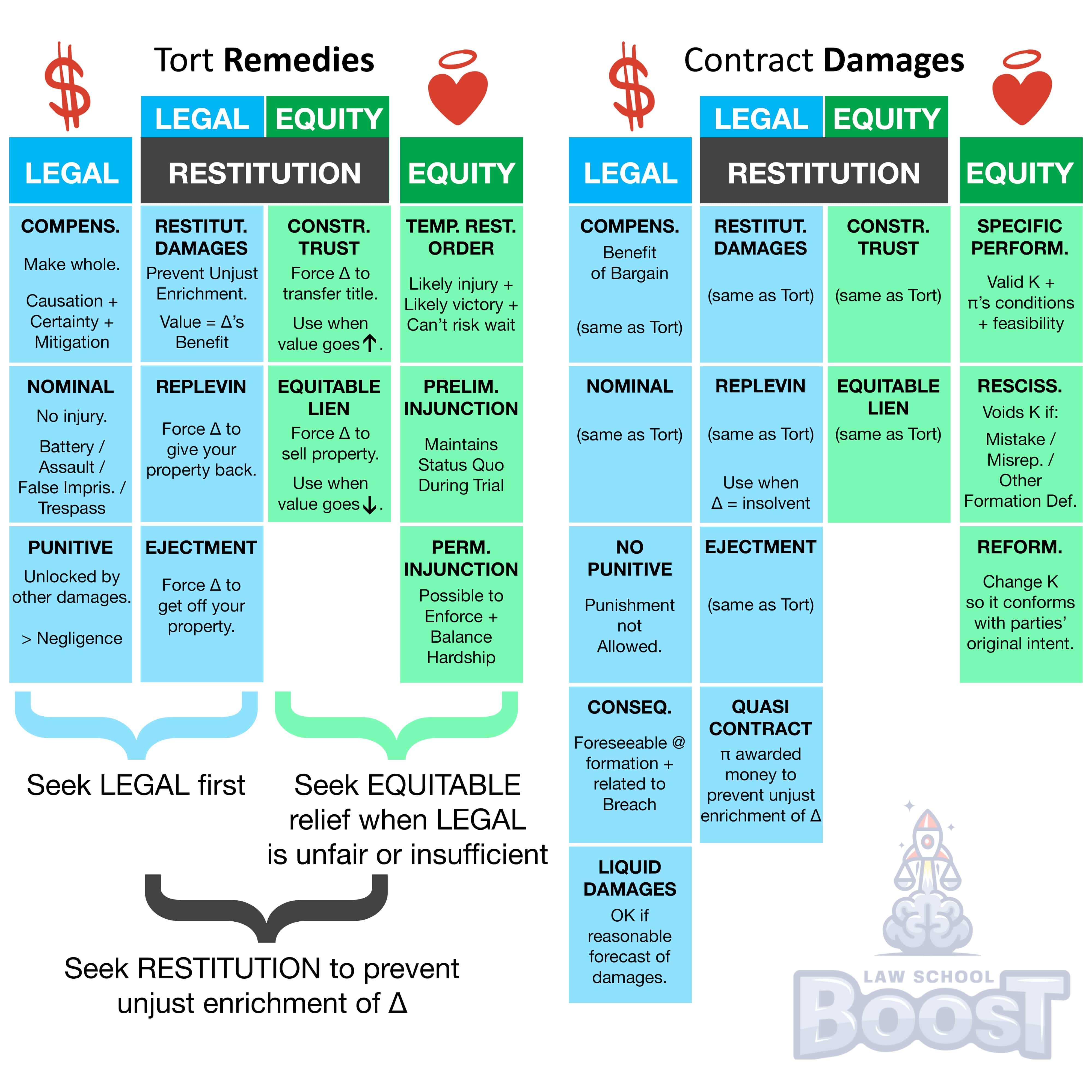🏥
Remedies • Tort - Legal Remedies
REM#006
Legal Definition
The damages must be unavoidable, such that the plaintiff must take reasonable steps to mitigate damages.
Plain English Explanation
If someone walked up to you and stabbed you in the arm, you likely wouldn't just stand there crying about it, watching yourself bleed out. Sure, it's not your fault that you were stabbed. And yes, the person who stabbed you should be held accountable for their actions. However, right now, as you bleed out, the most important action you can take is to stop the bleeding. The same logic applies to other types of damages, even boring business ones.
Put simply, if you are harmed, a court will expect you to put on your big kid pants and do something to try to limit the harm you are experiencing. For example, if you come home to your apartment and find that your sink has turned itself on and your kitchen floor is now wet, a court will expect you to at least try to shut the water off. You're not allowed to watch your entire apartment get flooded and then sue for damages associated with your entire apartment being flooded. The opposing party will point out that even though the damage to the kitchen was unavoidable since it happened before you came home, the damage to the rest of the apartment was completely avoidable had you attempted to mitigate the situation by turning a faucet knob to "off."
Put simply, if you are harmed, a court will expect you to put on your big kid pants and do something to try to limit the harm you are experiencing. For example, if you come home to your apartment and find that your sink has turned itself on and your kitchen floor is now wet, a court will expect you to at least try to shut the water off. You're not allowed to watch your entire apartment get flooded and then sue for damages associated with your entire apartment being flooded. The opposing party will point out that even though the damage to the kitchen was unavoidable since it happened before you came home, the damage to the rest of the apartment was completely avoidable had you attempted to mitigate the situation by turning a faucet knob to "off."
Hypothetical
Hypo 1: Bob has an old banged up car. Sam runs an auto repair shop. One day, Bob brings his car in to get it serviced. Sam negligently damages Bob's brakes. After Bob picks his car up, he notices the brakes aren't working correctly while leaving Sam's parking lot. Bob has a hot date that night, however, and can't be without his sweet ride. He figures he can have Sam deal with it later. That night, on his way to pick up Jill for their date, Bob's brakes fail and he slams into a tree, destroying his car. Result: Sam is liable for the damages he caused to Bob's breaks, but Bob shares some responsibility for his car being destroyed since he noticed his brakes were defective immediately after picking the car up and willingly chose to continue driving the car. Many of his damages were avoidable and it would be unfair to say Sam is solely responsible for Bob's stupidity.
Hypo 2: Amy hires Jill to replace the locks on her front door but, after removing the old locks, Jill decides that she was never really cut out for this type of work. She tells Amy she can't finish it, leaves halfway without installing the new locks, and gets on a bus to New York to audition for a Broadway show. 2 weeks later, because the doors don't have locks, someone breaks in and robs Amy. Amy sues Jill for damages. Result: Amy might have a case against Jill for the cost of hiring a new locksmith, but Jill's not responsible for the stolen goods. Amy has a duty to mitigate the damage of Jill failing to replace the locks by finding another locksmith or blocking her front door in the meantime. Here, she apparently did nothing about the fact that Jill didn't complete the job for 2 weeks, which allowed someone to rob her.
Hypo 2: Amy hires Jill to replace the locks on her front door but, after removing the old locks, Jill decides that she was never really cut out for this type of work. She tells Amy she can't finish it, leaves halfway without installing the new locks, and gets on a bus to New York to audition for a Broadway show. 2 weeks later, because the doors don't have locks, someone breaks in and robs Amy. Amy sues Jill for damages. Result: Amy might have a case against Jill for the cost of hiring a new locksmith, but Jill's not responsible for the stolen goods. Amy has a duty to mitigate the damage of Jill failing to replace the locks by finding another locksmith or blocking her front door in the meantime. Here, she apparently did nothing about the fact that Jill didn't complete the job for 2 weeks, which allowed someone to rob her.
Visual Aids


Related Concepts
In assessing compensatory damages for legal remedies in tort, how important is certainty and how is it assessed?
In assessing compensatory damages for legal remedies in tort, how must the judgment be paid?
In assessing compensatory damages for legal remedies in tort, what are general damages?
In assessing compensatory damages for legal remedies in tort, what are special damages?
In assessing compensatory damages for legal remedies in tort, what is foreseeability?
In assessing compensatory damages, what is causation?
In assessing legal remedies in tort, what are compensatory damages?
What are legal remedies in tort?
What are nominal damages for legal remedies in tort and what suits are they applicable to?
What are punitive damages for legal remedies in tort, how can a plaintiff get them, and what are their limitations?


